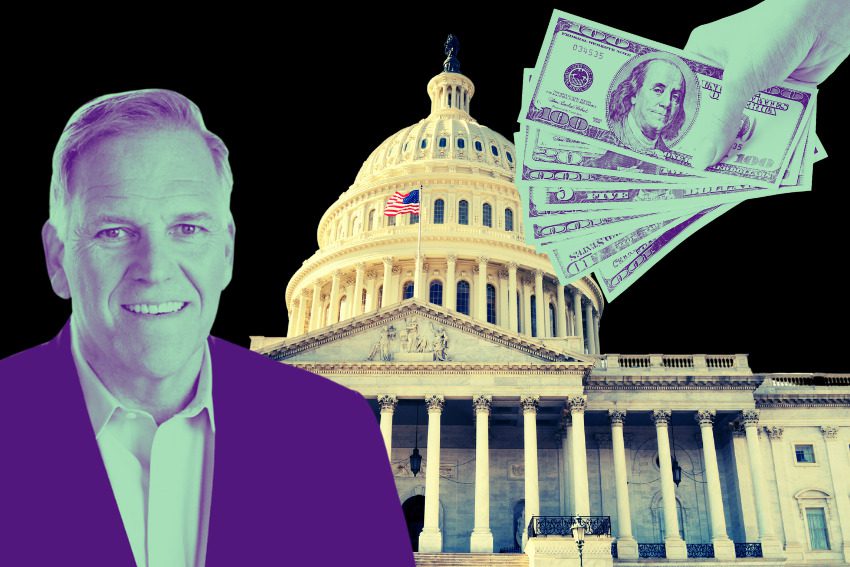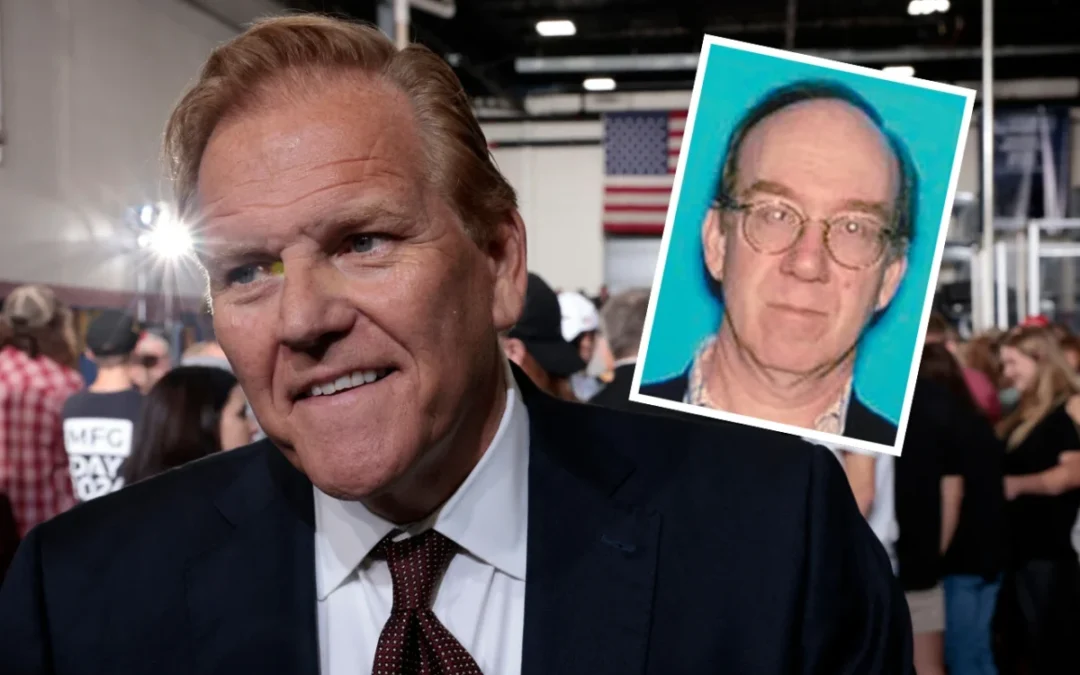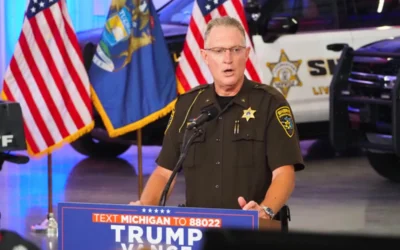
State lawmakers, union leaders, and advocates for campaign finance reform are warning Michigan voters to steer clear of Republican US Senate candidate Mike Rogers this year.
MICHIGAN—State Sen. Dayna Polehanki (D-Livonia) understands why some Michiganders may have lost faith in their elected officials’ ability to look out for their best interests—especially for those who had to deal with Republican US Rep. Mike Rogers in Congress for 14 years.
“It’s disheartening to me that Michiganders are reporting that they’re losing faith in politicians. But Mike Rogers is a perfect example,” Polehanki said during a virtual press conference last week. “I am going to be voting for and supporting candidates for office, Democrats who we can trust, who are putting their constituents first and aren’t interested in enriching themselves by shady self-dealing, and aren’t engaged in just extreme hypocrisy that can’t be overlooked.”
Polehanki, US Rep. Haley Stevens (D-Michigan), End Citizens United President Tiffany Muller, and Mike Huerta, the president of the United Auto Workers union Local 602 in Lansing, teamed up last week to shine a light on Rogers’ lengthy record of catering to special interests in Congress—and to warn Michiganders not to give him another chance to represent Michigan.
“There’s a lot at stake for hardworking Michiganders in this year’s election and in the Senate race, Mike Rogers … has shown time and time again that he only cares about his own bottom line, even when his work is to just enrich himself at Michiganders expense,” Stevens said. “We’re going to make sure that [voters] know who Mike Rogers is—he is not for them.”
Rogers served seven terms in Congress before announcing his retirement in 2014, moving to a mansion in Florida, and making tens of millions of dollars in various corporate board positions.
This year, Rogers canceled his voter registration in the state of Florida, moved back to Michigan, and is asking voters to send him back to Washington D.C. as a Republican candidate for the US Senate. In November, Rogers is expected to face off against Democratic US Rep. Elissa Slotkin for a seat currently held by soon-to-retire US Sen. Debbie Stabenow.
But with Rogers’ lengthy record of voting against campaign finance reforms that were designed to minimize corporate influence in politics, Michigan leaders—like Huerta—contend that Rogers is incapable of serving his constituents over special interests.
“We can’t trust Mike Rogers to stand up for us because he’s proven he won’t,” Huerta said. “So when we look at what he’s done when he was a representative, it’s exactly what he’ll do as a senator—and it’s not something that working families can afford to have on our side.”
Rogers on the Record
A review of Rogers’ stance on several key pieces of legislation during his time in Congress, helps to shed some light on how he might vote in the future, if he’s elected in November.
In 2002, Rogers voted against the Bipartisan Campaign Reform Act, otherwise known as the McCain-Feingold Act, which regulated political spending and required candidates to “stand by” their advertisements—namely by throwing a tagline with their name at the end of commercials.
Among other things, that legislation prohibited unlimited amounts of so-called “soft money” from being donated to national political parties and also limited campaign financing only to “hard money”—which are donations that are made directly to a candidate’s political campaign.
When asked about why he opposed the legislation ahead of the vote, Rogers, at the time, explained to one reporter: “It’s like the old saying about a prostitute. You’ll do it for a million or you’ll do it for a dollar—it still makes you a prostitute. It’s the same way with corruption.”
The legislation passed into law without Rogers’ support, and was billed as the most significant campaign finance law to be passed by federal lawmakers since at least 1974. But eight years later, the US Supreme Court’s ruling in Citizens United v. Federal Election Commission essentially reopened the floodgates for huge amounts of money to be spent on campaigns through unlimited corporate and other special interest political donations.
In 2006, Rogers voted against a House Resolution that sought to ban lawmakers from accepting gifts from lobbyists, including travel expenses. It also sought to close (or at least slow down) the so-called “revolving door” of ex-lawmakers retiring from Congress to pursue often-lucrative careers as lobbyists by extending the lobbying ban on former legislators from one to two years.
Later that summer, Rogers was reportedly spotted on the bow of a luxury yacht alongside lobbyists with the National Marine Manufacturers Association. The event—dubbed the “Congressional Cruise Series”—was billed, unabashedly, as a way for lobbyists to develop relationships with influential politicians, according to reports from the Chicago Tribune.
A few years later, in 2010, Rogers voted against the DISCLOSE Act, which would’ve required groups who spend money on elections to disclose their largest donors—namely to help lift the veil on so-called “dark money” groups that hide their donors while trying to influence voters.
That bill also included a requirement for campaigns to report their political expenditures within 24 hours—particularly for political expenditures of $10,000 or more that are made prior to 20 days before an election, and for expenditures of $1,000 or more within 20 days of an election.
The legislation was designed to provide voters with more timely details ahead of Election Day about who (or what) is funding campaigns and trying to influence their vote. The bill ended up failing by one vote in the face of a Senate Republican filibuster.
In 2011, Rogers voted against another piece of legislation that would’ve required presidential campaigns to disclose any contributions from foreign individuals, corporations, or countries—as well as any donor who spends more than $100,000 during the presidential election cycle.
That legislation passed the US House, but ultimately never made it through the Senate.
And in 2014, Rogers voted for legislation that would have effectively blocked the IRS from issuing proposed regulations designed to require more transparency in political spending.
At the time, advocacy groups said the legislation only helped preserve a tax loophole created through Citizens United that allows corporations, associations, and the super rich to conceal multi-million dollar investments through the guise of so-called “social welfare” organizations.
That legislation passed the House but failed to advance in the Senate.
‘Everything People Hate About Politics’
When asked about his lengthy record of opposing campaign finance reforms earlier this summer, a spokesman for Rogers’ campaign declined to facilitate an interview and emailed a two-sentence statement that attacked Slotkin and claimed that The ‘Gander is “fake news.”
This week, Stevens and other leaders contended that Rogers’ voting record speaks for itself.
“It’s important that you listen to voters and constituents and when you’re in that chamber, you vote with their best interests in mind. That’s just not what Mike Rogers will do. He’s out for himself. He’s not out for the voters, and he doesn’t care what they have to say,” Stevens said. “Our next senator should be someone who stands up for Michigan workers, fights for unions, and who puts the middle class at the forefront of their agenda. The stakes are very high.”
Muller added: “We believe that elected officials should represent the people and not corporate special interest, not their personal bank accounts, and not their biggest donors. But Mike Rogers, that’s all he’s focused on representing. He’s focused on helping out his biggest donors at the expense of working Michiganders. And he represents everything that people hate about politics. … It’s clear that he cannot be trusted to do anything aside from padding his own bottom line.”
On the other side of the aisle, Slotkin has billed herself as a champion for government transparency and accountability—including by co-sponsoring House Resolution 1118, yet another iteration of the DISCLOSE Act, which includes measures that Rogers has opposed.
Slotkin’s bill, like its predecessors, aimed to expand a federal ban on campaign spending by foreign nationals, as well as require disclosure of campaign expenditures for corporations, labor groups, and other organizations—including revealing their top donors. The legislation was referred to a committee, where it (again) failed to advance under Republican leadership.
“For too long, our government has been working for big business and the wealthy instead of prioritizing Michigan’s families,” Slotkin said in a statement released earlier this year. “Voters deserve to know that their elected leaders are working on their behalf, not looking out for our own financial interests. Cleaning up DC will continue to be a top priority for me in the Senate.”
READ MORE: Rogers tries to distance Senate campaign from past attempts to ban IVF
For the latest Michigan news, follow The ‘Gander on Twitter.
Follow Political Correspondent Kyle Kaminski here.
Support Our Cause
Thank you for taking the time to read our work. Before you go, we hope you'll consider supporting our values-driven journalism, which has always strived to make clear what's really at stake for Michiganders and our future.
Since day one, our goal here at The 'Gander has always been to empower people across the state with fact-based news and information. We believe that when people are armed with knowledge about what's happening in their local, state, and federal governments—including who is working on their behalf and who is actively trying to block efforts aimed at improving the daily lives of Michigan families—they will be inspired to become civically engaged.


State lawmakers sound alarm on rising costs as Trump returns to Michigan
Ahead of President Donald Trump’s visit to Detroit this week, Michigan lawmakers signed onto a new report warning that his economic agenda is...

OPINION: Keep the lights on for Michigan electrical workers, save clean energy investments
Trump’s attacks on clean energy are setting Michigan back. For more than 100 years, the members of the International Brotherhood of Electrical...

Report: Billionaire accused in Florida prostitution sting donates $12k to boost Mike Rogers’ Senate campaign
It’s the latest example of Rogers’ bid for US Senate being bankrolled by controversial figures—including a Texas oil mogul who pushes Christian...

Michigan Democrats call for GOP response to leaked, slur-filled Young Republicans’ chat
BY KATHERINE DAILEY, MICHIGAN ADVANCE MICHIGAN—In the wake of a report from POLITICO detailing a chat among leaders of Young Republicans’ chapters...

Opinion: The America my parents believed in is disappearing
Michigan State Rep. Mai Xiong reflects on the fear Trump's immigration policies are causing for Michigan families. Last November, I wrote in the...





